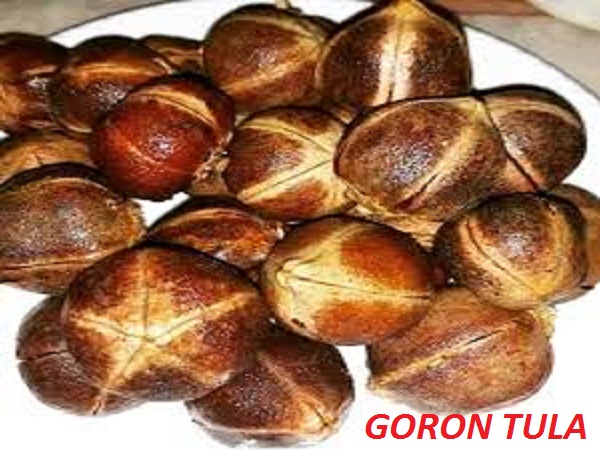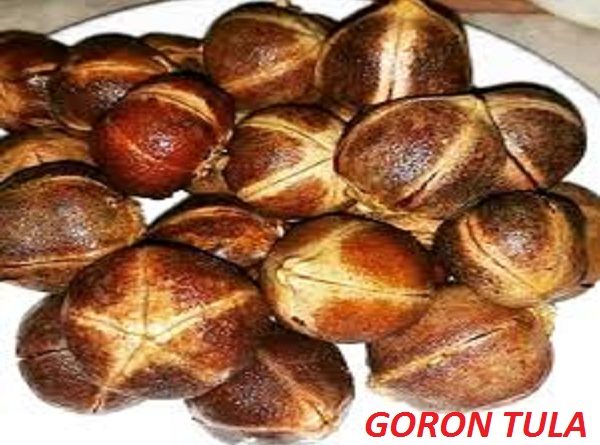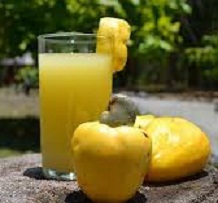Goron Tula Fruit: 25 Questions People Ask
Goron Tula Fruit: 25 Questions People Ask
Table of Contents
About Goron Tula Fruit
Goron Tula Fruit or Snot Apple is a sweet and chewy nut and is often referred to as African Chewing Gum fruit. Health Benefits of Goron Tula Fruit. Goron Tula Fruit, also known as “African Velvet Tamarind” or “Snot Apple,” is a fruit native to West Africa. It’s highly regarded for its various health benefits, including:
Nutrient-rich: Goron Tula is packed with essential nutrients such as vitamins (particularly vitamin C), minerals like iron and potassium, and dietary fiber.
Boosts Immunity: Its high vitamin C content makes it beneficial for supporting the immune system, and helping the body fight off infections and illnesses.
Improves Digestive Health: The fiber content in Goron Tula aids in digestion and helps prevent constipation. It also supports a healthy gut microbiome, promoting overall digestive health.
Source of Antioxidants: Antioxidants in Goron Tula help neutralize harmful free radicals in the body, reducing oxidative stress and lowering the risk of chronic diseases like heart disease and cancer.
Potential Aphrodisiac: In traditional medicine, Goron Tula is believed to have aphrodisiac properties, enhancing libido and sexual performance. However, scientific evidence supporting this claim is limited.
Rich in Iron: Goron Tula is a good source of iron, which is essential for the production of red blood cells and the prevention of anemia.
Regulates Blood Sugar Levels: Some studies suggest that Goron Tula may help regulate blood sugar levels, making it potentially beneficial for individuals with diabetes or those at risk of developing the condition.
Supports Skin Health: The vitamin C and antioxidants in Goron Tula contribute to healthy skin by promoting collagen production, which helps maintain skin elasticity and prevent premature aging.
Boosts Energy Levels: The combination of nutrients in Goron Tula, including carbohydrates and iron, can help boost energy levels and combat fatigue.
Anti-inflammatory Properties: Goron Tula contains compounds with anti-inflammatory properties, which may help reduce inflammation in the body and alleviate symptoms of inflammatory conditions like arthritis.
Overall, Goron Tula is a nutritious fruit with several potential health benefits, but more research is needed to fully understand its effects and mechanisms of action. As with any food or supplement, it’s essential to consume Goron Tula as part of a balanced diet for optimal health benefits.
Goron Tula Fruit and Fertility
Goron Tula, also known as “African Velvet Tamarind,” has been traditionally believed to have aphrodisiac properties and is sometimes associated with fertility in certain cultures. However, scientific evidence specifically linking Goron Tula to fertility is limited, and more research is needed to substantiate these claims.
That said, Goron Tula does contain various nutrients that could indirectly support reproductive health and potentially aid fertility:
Vitamins and Minerals: Goron Tula is rich in vitamins and minerals like vitamin C, iron, and potassium, which are essential for overall health, including reproductive health.
Antioxidants: Antioxidants found in Goron Tula may help reduce oxidative stress and inflammation in the body, which can have a positive impact on fertility by supporting reproductive organ function.
Hormonal Balance: Some traditional medicinal practices suggest that Goron Tula can help balance hormones, which could potentially support fertility. However, scientific evidence supporting this claim is lacking.
Libido Enhancement: In traditional medicine, Goron Tula is believed to have aphrodisiac properties, which could indirectly support fertility by enhancing libido and sexual performance.
While Goron Tula may offer potential benefits for fertility, it’s essential to approach such claims with caution and consult with a healthcare professional for personalized advice.
No single food or supplement can guarantee fertility because fertility depends on a variety of factors, including lifestyle, diet, health issues, and genetics. A balanced diet, regular exercise, maintaining a healthy weight, and managing stress are all important aspects of supporting reproductive health.
Goron Tula Fruit: 25 Questions People Ask
Q: What is Goron Tula?
A: Goron Tula, also known as “African chewing gum,” is a fruit native to West Africa. It comes from the tree known scientifically as Azanza garckeana.
Q: What are the health benefits of Goron Tula?
A: Goron Tula is believed to have several health benefits, including:
- Rich in nutrients: It contains vitamins, minerals, and antioxidants, which are beneficial for overall health.
- Digestive health: Goron tula is said to aid digestion and relieve constipation due to its high fiber content.
- Boosting libido: Traditionally, it’s believed to have aphrodisiac properties, enhancing sexual desire and performance.
- Menstrual health: Some believe it can help regulate menstrual cycles and alleviate menstrual pain.
- Immune support: The antioxidants in Goron Tula may help strengthen the immune system and protect against diseases.
- Skin health: It’s claimed to improve skin elasticity and promote a healthy complexion.
- Postpartum recovery: In some cultures, women consume it after giving birth to speed up recovery and increase energy levels.
Q: Are there any scientific studies supporting these claims?
A: While Goron Tula has been used traditionally for its purported health benefits, scientific studies validating these claims are limited. More research is needed to confirm its effectiveness and understand its mechanisms of action.
Q: How can Goron Tula be consumed?
Goron Tula can be consumed fresh, dried, or in powdered form. It can be eaten as a snack, added to dishes, or brewed into tea. Some also use it as a natural sweetener or flavoring agent in drinks and desserts.
Q: Is Goron Tula safe to consume?
A: Generally, Goron Tula is considered safe for consumption when taken in moderate amounts. However, individuals with allergies to similar fruits or those with underlying health conditions should consult a healthcare professional before consuming it.
Q: Can Goron Tula help with weight loss?
A: Goron Tula’s high fiber content may aid in weight loss by promoting feelings of fullness and reducing appetite. However, it’s not a magical solution for weight loss, and a balanced diet and regular exercise are crucial for achieving and maintaining a healthy weight.
Q: Does Goron Tula have any known side effects?
A: There are no widely reported side effects of consuming Goron Tula. However, excessive consumption may lead to digestive discomfort or allergic reactions in some individuals.
Q: Is Goron Tula suitable for pregnant women?
A: Pregnant women should consult their healthcare provider before consuming Goron Tula, as there is limited scientific evidence on its safety during pregnancy.
Q: Can Goron Tula be used to treat erectile dysfunction?
A: Goron Tula is traditionally believed to have aphrodisiac properties and may help improve sexual function in some individuals. However, more research is needed to confirm its effectiveness in treating conditions like erectile dysfunction.
Q: How does Goron Tula taste?
A: Goron Tula has a unique sweet and tangy flavor, often described as a combination of tartness and sweetness. The taste can vary slightly depending on the ripeness of the fruit.
Q: Is Goron Tula available outside of Africa?
A: Goron Tula is primarily grown and consumed in West Africa, but it may be available in some specialty stores or online retailers outside of the region.
Q: Can Goron Tula be used in cooking?
A: Yes, Goron Tula can be used in cooking. It can be added to various dishes such as soups, stews, sauces, and baked goods to enhance flavor and nutritional content.
Q: How should Goron Tula be stored?
Goron Tula can be stored at room temperature in a cool, dry place for short-term storage. For longer storage, it can be kept in the refrigerator or freezer to maintain freshness.
Q: Does Goron Tula have any cultural significance?
A: Yes, Goron Tula holds cultural significance in West African countries where it is grown. It is often used in traditional ceremonies, rituals, and celebrations, and it is valued for its medicinal and nutritional properties.
Q: Can Goron Tula be juiced?
A: Yes, Goron Tula can be juiced to extract its nutrients and flavors. The juice can be consumed on its own or mixed with other fruits or liquids to create refreshing beverages.
Q: Are there any restrictions on the export or import of Goron Tula?
A: Regulations regarding the export and import of Goron Tula may vary depending on the country and its agricultural laws. It’s important to check with relevant authorities or consult legal experts before exporting or importing Goron Tula.
Q: Can Goron Tula be used to make skincare products?
A: Some people use Goron Tula extract or oil in skincare products due to its purported benefits for skin health. However, more research is needed to understand its effectiveness and safety for topical use.
Q: How long does Goron Tula typically last?
A: Fresh Goron Tula can last for several days to a week when stored properly. Dried Goron Tula can last for several months or longer if kept in an airtight container away from moisture and heat.
Q: Is Goron Tula high in sugar?
A: Goron Tula contains natural sugars, but it’s not excessively high in sugar compared to some other fruits. However, individuals monitoring their sugar intake should consume it in moderation.
Q: Can Goron Tula be used as a natural remedy for colds or flu?
A: Some believe that Goron Tula’s nutritional properties and immune-boosting effects may help support the body’s defenses against colds and flu. However, more scientific research is needed to confirm its efficacy in this regard.
Q: Is Goron Tula suitable for people with diabetes?
A: Goron Tula’s high fiber content may help regulate blood sugar levels, making it potentially suitable for people with diabetes. However, individuals with diabetes should monitor their blood sugar levels and consult a healthcare professional before incorporating Goron Tula into their diet.
Q: Can Goron Tula be used as a natural remedy for constipation?
A: Yes, Goron Tula is believed to have laxative effects due to its high fiber content, which can help relieve constipation and promote regular bowel movements.
Q: Can Goron Tula be used as a natural sweetener?
A: Yes, Goron Tula can be used as a natural sweetener due to its sweet taste. It can be added to beverages, desserts, and other dishes as a healthier alternative to refined sugar.
- What Is Goron Tula Fruit Used For?
The health benefits of Goron Tula fruit include prevention of high blood pressure, ease digestion, lower blood sugar level, improve the body’s immune system, and can also, serve as a remedy for asthma.
- What Are The Health Benefits Of Goron Tula Fruit?
The species is used as an herbal medicine for diseases and ailments such as infertility, chest pains, cough, liver problems, menstruation problems, and transmitted infections.
- How Do You Eat A Goron Tula Fruit?
In addition to being eaten raw, you can also soak it in water to make jelly.
Another method of consuming gorontula is by boiling it and relishing it into porridge.
- What Is Goron Tula In Yoruba?
Goron Tula fruit (Hausa) is sometimes referred to as Thespesia or Silky Kola.
It is also known as tree hibiscus and snot apple in English. However, there is no Yoruba name for it at the moment.
- Can a Man Use Goron Tula Fruit?
Its fruit could be used as a fertility enhancer for both men and women.
- Can Goron Tula Be Boiled?
Goron Tula is a fruit that has sections and it is easily split to produce gum-like syrup which can be cooked, soaked in water, or honey before eating and it can also be eaten fresh.
- How Does Goron Tula Fruit Taste?
It tastes slimy sweet and slippery in the mouth when eating.
- What Is The Benefit Of Goron Tula?
“Azanza garckeana indicates that the species has a wide range of pharmacological activities such as antibacterial, antihyperglycemic, antifungal, antimalarial, antioxidant, and iron absorption”.
According to the research, the seeds are used as an herbal medicine for diseases and ailments.
- Goron Tula Side Effects
People of all ages are safe to consume this fruit because there is no side effect
- Are Goron Tula Seeds Edible?
Azanza gardenia (Goron Tula) is a valuable edible indigenous fruit tree species.
- What Is African Chewing Gum?
The snot apple is widely referred to as the African chewing gum.
- What Is The English Name Of Goron Tula?
The fruit, which is also known as tree hibiscus, Azanza, and snot apple in English, is an edible indigenous fruit widely distributed in Tula, Kaltungo Local Government Area of Gombe State and in Michika, Adamawa State all in Nigeria.
- What Is Goron?
The Gorons are a recurring race in the Legend of Zelda series.
The Gorons are humanoid, rock-eating races that dwell in the mountains.
Notwithstanding their hulking appearance, Gorons are a relatively peaceful species.
- Where Can I Get Goron Tula?
It is mostly found in Tula, a community in Kaltungo Local Government Area of Gombe State, and Michika, a community in Adamawa State.
- Can A Breastfeeding Mother Take Goron Tula?
Goron Tula is a 100% healthy fruit and can be consumed by both pregnant and breastfeeding mothers.
- What Is Matohwe In English?
Thinking of matohwe, the snot apple, widely referred to as the African chewing gum.
In other parts of the country, it is given the Shona name mugurura or mugururu.
- What Is Silky Kola?
Silky Kola is a common nut known in some parts of the country as Goron Tula or Snot Apple some also refer to it as Azanza Garckeana.
It is a nut or fruit consumed by both men and women who desire to improve their health.
- How Is Silky Kola Used?
The components of this fruit include amino acids, carotenoids, cyanogenic glucosides, ascorbic acid, alkaloids, and flavonoids.
It is can be used to treat cough, cure chest pains, and help prevent high blood pressure not forgetting it can also serve as a cure for liver problems.
- What Are The Benefits Of Silky Kola?
This wonder fruit (Goron Tula) helps to cleanse the body system, and prevent high blood pressure, and fertility challenges.
It also serves as an aphrodisiac, and aids against liver problems, and mental illness among other diseases.
- What Does Jaaruma Empire Do?
Jaaruma is the brain behind the most phenomenal discovery of all time, the superpower products, and the highest gross selling products of all time.
Jaaruma nets in a huge sum of money every month from selling her products to men and women.
Biography – Jaaruma Empire
www.jaarumaempire.com
- Who Is Jaruma Empire?
Hauwa Saidu Mohammed (born 26 October 1993) known as Jaruma is a Nigerian therapist, entrepreneur, and founder of Jaaruma Empire Limited.
Jaaruma – Wikipedia
- Where Can I Buy Snot Apple In Lagos
Check out the following websites and they deliver online:
Jiji. ng and
sohealthyng.com
Also, you can get snot apple from Accra, Ghana.
- What Are The Health Benefits Of Snot Apple?
- Firstly, it prevents high blood pressure.
- Secondly, it prevents liver problems.
- Solve infertility
- Fourthly, it cleanses your body system.
- Cancer prevention.
- Boost bowel movement.
- Above all, it improves the immune system.
- How Is Goron Tula Eaten?
The fruits are eaten when ripe. They are chewed like chewing gum producing a sweet glutinous taste.
- Does Goron Tula Cure Fibroid?
No drug or kit dissolves fibroid. Beware! Surgery remains the best fibroid treatment.





How long does it take before it works?
The result should be immediate and evident
How long does goron Tula take before it start working
Immediately
I will definitely get this fruit
Pingback: Goron Tula Health Benefits: Fruit That Cures It All | Side Effects - 9jafoods